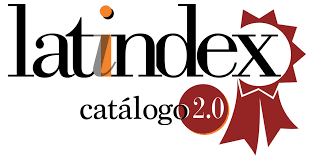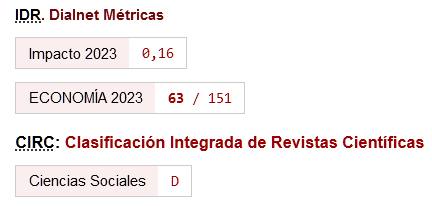Economía y psicología: hacia una praxeología económica rigurosa
DOI:
https://doi.org/10.46661/rec.10188Palabras clave:
Racionalidad económica, sesgos y heurísticas, racionalidad contextual, microeconomiaResumen
El trabajo aborda los diversos puntos de vista sobre la racionalidad económica y, de ahí, los dos grandes programas de investigación que configuran la psicología económica, esto es, el programa de los sesgos y las heurísticas, y el programa de las heurísticas rápidas y frugales y la racionalidad contextual. Se destacan cuatro importantes diferencias: la interpretación de los sesgos cognitivos, la concepción de las heurísticas, la naturaleza de los modelos y la solidez de los axiomas usados como referentes.
Descargas
Citas
Altman, Morris (ed.) (2017): Handbook of Behavioural Economics and Smart Decision-Making. Rational Decision-Making within the Bounds of Reason, Cheltenham: Edward Elgar.
https://doi.org/10.4337/9781782549598 DOI: https://doi.org/10.4337/9781782549598
Anger, Erik (2012): A Course in Behavioral Economics, London: Palgrave Macmillan.
Ariely, Dan (2008): Les trampes del desig. Els impulsos irracionals que influeixen en les nostres decisions quotidianes, Barcelona: Columna.
Ariely, Dan (2011): Las ventajas del deseo. Cómo sacar partido de la irracionalidad en nuestras relaciones personales y laborales, Barcelona: Ariel.
Ariely, Dan (2012): Por qué mentimos... en especial a nosotros mismos. La ciencia del engaño puesta al descubierto, Barcelona: Ariel.
Berg, Nathan (2014): "The consistency and ecological rationality approaches to normative bounded rationality", Journal of Economic Methodology Nº 21(4), pp. 375-395 .
https://doi.org/10.1080/1350178X.2014.969910 DOI: https://doi.org/10.1080/1350178X.2014.969910
Berg, Nathan y Gigerenzer, Gerd (2010): As-if behavioral economics: Neoclassical economics in disguise?, MPRA Paper No. 26586. Disponible en https://mpra.ub.uni-muenchen.de/26586/
https://doi.org/10.2139/ssrn.1677168 DOI: https://doi.org/10.2139/ssrn.1677168
Berg, Nathan et al. (2008): Inconsistency Pays?: Time-Inconsistent Subjects and EU violators Earn More. Disponible en https://ssrn.com/abstract=1692437.
https://doi.org/10.2139/ssrn.1692437 DOI: https://doi.org/10.2139/ssrn.1692437
Boettke, Peter J. y Candela, Rosolino A. (2017): "Rational choice as if the choosers were human", en Altman, Morris (ed.): Handbook of Behavioral Economics and Smart Decision-Making. Rational Decision- Making within the Bounds of Reason, Cheltenham: Edward Elgar, pp. 68-85.
https://doi.org/10.4337/9781782549598.00011 DOI: https://doi.org/10.4337/9781782549598.00011
Bowles, Samuel (1998): Endogenous Preferences: The Cultural Consequences of Markets and other Economic Institutions, Journal of Economic Literature Nº XXXVI, pp. 75-111.
Bowles, Samuel (2010): Microeconomía. Comportamiento, instituciones y evolución. Texto íntegro disponible en https://bowlesmicroeconomia.uniandes.edu.co.
Brandstätter, Eduard et al. (2006): "The Priority Heuristic: Making Choices Without Trade-Offs", Psychological Review Nº 113(2), pp. 409-432.
https://doi.org/10.1037/0033-295X.113.2.409 DOI: https://doi.org/10.1037/0033-295X.113.2.409
Bunge, Mario (2016): Materia y mente. Una investigación filosófica, México: Siglo XXI editores.
Cartwright, Edward (2018): Behavioral Economics, London: Routledge, 3a. ed.
https://doi.org/10.4324/9781315105079-1 DOI: https://doi.org/10.4324/9781315105079-1
Cialdini, Robert B. (2007): Influence. The Psycology of Persuasion, New York: HarperCollinsPublishers, 3a. ed.
Cialdini, Robert B. (2017): Pre-suasión. Un método revolucionario para influir y persuadir, Barcelona: Penguin Random House.
DeMiguel, Victor et al. (2009): "Optimal Versus Naive Diversification: How Inefficient is the 1/N Portfolio Strategy?", The Review of Financial Studies, Nº 22(5), pp. 1915-1953.
https://doi.org/10.1093/rfs/hhm075 DOI: https://doi.org/10.1093/rfs/hhm075
Dobelli, Rolf (2013): El arte de pensar. 52 errores de lógica que es mejor dejar que cometan otros, Barcelona: Ediciones B.
Earl, Peter E. (1986): Lifestyle Economics. Consumer Behavior in a Turbulent World, Brighton: Wheatsheaf books.
Earl, Peter E. (1990): "Economics and Psychology: A Survey", The Economic Journal Nº (C)402, pp. 718- 755.
https://doi.org/10.2307/2233656 DOI: https://doi.org/10.2307/2233656
Earl, Peter E. (1995): Microeconomics for Business and Marketing. Lectures, Cases and Worked Essays, Cheltenham (UK): Edward Elgar.
Elster, Jon (1990): Tuercas y tornillos. Una introducción a los conceptos básicos de las ciencias sociales, Barcelona: Editorial Gedisa.
Elster, Jon (1994): Lógica y sociedad. Contradicciones y mundos posibles, Barcelona: Editorial Gedisa
Elster, Jon (2010): La explicación del comportamiento social. Más tuercas y tornillos para las ciencias sociales, Barcelona: Editorial Gedisa.
Fine, Ben y Milonakis, Dimitris (2009): From Economics Imperialism to Freakonomics. The shifting boundaries between economics and other social sciences, London: Routledge
https://doi.org/10.4324/9780203880289 DOI: https://doi.org/10.4324/9780203880289
Foer, Franklin (2017): World Without Mind. The Existential Threat of Big Tech, New York: Penguin Press.
Guéguen, Nicolas (2016): Psychologie du consommateur. Pour mieux comprendre comment on vous influence. Paris: Dunod.
Gigerenzer, Gerd (1991): "How to Make Cognitive Illusions Disappear: Beyond 'Heuristicropean Review of Social Psychology Nº 2, pp. 83-115.
https://doi.org/10.1080/14792779143000033 DOI: https://doi.org/10.1080/14792779143000033
Gigerenzer, Gerd (2002): Calculated risks. How to know when numbers deceive you, Nueva York: Simon and Schuster.
Gigerenzer, Gerd (2008a): Decisiones instintivas. La inteligencia del inconsciente, Barcelona: Ariel
Gigerenzer, Gerd (2008b): "Why Heuristics Work", Perspectives on Psychological Science Nº 3(1), pp. 20- 29.
https://doi.org/10.1111/j.1745-6916.2008.00058.x DOI: https://doi.org/10.1111/j.1745-6916.2008.00058.x
Gigerenzer, Gerd (2014): Risk Savvy. How to Make Good Decisions, New York: Penguin Books.
Gigerenzer, Gerd (2015): Simply Rational. Decision Making in the Real World, Oxford: Oxford University Press.
https://doi.org/10.1093/acprof:oso/9780199390076.001.0001 DOI: https://doi.org/10.1093/acprof:oso/9780199390076.001.0001
Gigerenzer, Gerd (2018): "The Bias Bias in Behavioral Economics", Review of Behavioral Economics Nº 5, pp. 303-336.
https://doi.org/10.1561/105.00000092 DOI: https://doi.org/10.1561/105.00000092
Gigerenzer, Gerd y Brighton, Henry (2009): "Homo Heuristicus: Why Biased Minds Make Better Inferences", Topics in Cognitive Science Nº 1, pp. 107-143.
https://doi.org/10.1111/j.1756-8765.2008.01006.x DOI: https://doi.org/10.1111/j.1756-8765.2008.01006.x
Gigerenzer, Gerd y Goldstein, Daniel G. (1996): "Reasoning the Fast and Frugal Way: Models of Bounded Rationality", Psychological Review Nº 103(4), pp. 650-669.
https://doi.org/10.1037//0033-295X.103.4.650 DOI: https://doi.org/10.1037//0033-295X.103.4.650
Gigerenzer, Gerd et al. (eds.) (2011): Heuristics. The Foundations of Adaptive Behavior, Oxford: Oxford University Press.
Gilboa, Itzhak et al. (2004): Rationality of Belief or: Why Bayesianism is Niether Necessary Nor Sufficient for Rationality, Yale University Cowles Foundation Discussion Paper No. 1484 & Penn Institute for Economic Research (PIER) Working Paper No. 04-011. Documento disponible en htrp://ssrn.com/abstract=523502.
Gilboa, Itzhak et al. (2012): "Rationality of Belief or: why Savage's axioms are neither necessary nor sufficient for rationality", Syntese. An International Journal for Epistemology, Methodology and Philosophy of Science Nº 1(187), pp. 11-31.
https://doi.org/10.1007/s11229-011-0034-2 DOI: https://doi.org/10.1007/s11229-011-0034-2
Goldstein, Daniel G. y Gigerenzer, Gerd (2002): "Models of Ecological Rationality: The Recognition Heuristic", Psychological Review Nº 109(1), pp. 75-90.
https://doi.org/10.1037//0033-295X.109.1.75 DOI: https://doi.org/10.1037//0033-295X.109.1.75
Hammond, John S. et al. (2002): Smart Choices. A Practical Guide to Making Better Life Decisions, New York: Broadway Books.
Harstad, Ronald M. y Selten, Reinhard (2013): "Bounded-Rationality Models: Tasks to Become Intellectually Competitive", Journal of Economic Literature Nº 51(2), pp. 496-511.
https://doi.org/10.1257/jel.51.2.496 DOI: https://doi.org/10.1257/jel.51.2.496
Hausman, Daniel M. (2012): Preference, Value, Chioce, and Welfare, Cambridge: Cambridge University Press.
Heukelom, Floris (2014): Behavioral Economics. A History, Cambridge: Cambridge University Press.
https://doi.org/10.1017/CBO9781139600224 DOI: https://doi.org/10.1017/CBO9781139600224
Ingrao, Bruna e Israel, Giorgio (2015): The Invisible Hand. Economic Equilibrium in the History of Science. Texto íntegro disponible en http://www.academia.edu.
Innocenti, Alessandro (2009): L'economia cognitiva, (Bussole 341), Roma: Carocci.
Joule, Robert-Vincent y Beauvois, Jean-Léon (2014): Petit traité de manipulation à l'usage des honnêtes gens, Grenoble: Presses Universitaires de Grenoble.
Just, David R. (2014): Introduction to Behavioral Economics. Noneconomic Factors that Shape Economic Decisions, Hoboken (NJ): John Wiley and Sons.
Kahneman, Daniel (2006): "New Challenges to the Rationality Assumption" en Lichtenstein, Sarah y Slovic, Paul (ed.): The Construction of Preference, Cambridge: Cambridge University Press, pp. 487-503.
https://doi.org/10.1017/CBO9780511618031.028 DOI: https://doi.org/10.1017/CBO9780511618031.028
Kahneman, Daniel (2012) Pensar rápido, pensar despacio, Barcelona: Random House Mondadori.
Kahneman, Daniel y Tversky, Amos (1979): "Prospect Theory: An analysis of decision under risk", Econometrica Nº 47(2), pp. 263-291.
https://doi.org/10.2307/1914185 DOI: https://doi.org/10.2307/1914185
Keen, Andrew (2016): Internet no es la respuesta, Barcelona: Casa catedral.
Kimball, Miles S. (2015): Cognitive Economics, NBER Working Paper No. 20834, Cambridge (Mass): NBER.
Kurz-Milcke, Elke y Gigerenzer, Gerd (2007): "Heuristic Decision Making", Marketing-JRM Nº 1, pp. 48-60.
Lavoie, Marc (2014): Post-Keynesian Economics: New Foundations, Cheltenham (UK): Edward Elgar.
Lehrer, Jonah (2009): How we decide, New York: Houghton Mifflin Harcourt.
Mirowski, Philip (2014): Nunca dejes que una crisis te gane la partida. ¿Cómo ha conseguido el neoliberalismo, responsable de la crisis, salir indemne de la misma?, Barcelona: Deusto.
Motterlini, Matteo (2008): Economía emocional. En qué nos gastamos el dinero y porqué, Barcelona: Paidós.
Motterlini, Matteo (2010): Trampas mentales. Cómo defenderse de los engaños propios y ajenos, Barcelona: Paidós.
Motterlini, Matteo y Guala, Francesco (2015): Mente, Mercati, Decisioni, Milano: Università Bocconi Editore.
Mousavi, Shabnam et al. (2017): "Rethinking behavioral economics through fast-and-frugal heuristics" en Frantz, Roger et al. (eds.) Routledge Handbook of Behavioral Economics, London: Routledge, pp. 280-296.
Payne, John W. et al. (1993): The adaptive decision maker, Cambridge: Cambridge University Press.
https://doi.org/10.1017/CBO9781139173933 DOI: https://doi.org/10.1017/CBO9781139173933
Piattelli, Massimo (1995): Los túneles de la mente. ¿Qué se esconde tras nuestros errores?, Barcelona: Editorial Crítica.
Rabin, Matthew (1998): "Psychology and Economics", Journal of Economic Literature Nº (XXXVI) 3, pp. 11-46.
Schelling, Thomas C. (2006): Micromotives and Macrobehavior with a New Preface and the Nobel Lecture, New York: W. W. Norton and Company. Existe traducción en castellano de la primera edición de 1978.
Sent, Ester-Mirjam (2004): "Behavioral Economics: How Psychology Made Its (Limited) Way Back Into Economics", History of Political Economy Nº 36(4), pp. 735-760.
https://doi.org/10.1215/00182702-36-4-735 DOI: https://doi.org/10.1215/00182702-36-4-735
Shafir, Eldar (ed.) (2018): The Essential Tversky, Cambridge (Mass): The MIT Press.
Simon, Herbert A. (1955): "A Behavioral Model of Rational Choice", The Quartely Journal of Economics Nº 69(1), pp. 99-118.
https://doi.org/10.2307/1884852 DOI: https://doi.org/10.2307/1884852
Simon, Herbert A. (1959): "Theories of Decision-Making in Economics and Behavioral Science", The American Economic Review Nº 49(3), pp. 253-283
Skořepa, Michal (2011): Decision-making. A Behavioral Economic Approach, Houndmills: Palgrave-MacMillan.
https://doi.org/10.1007/978-1-137-28565-2 DOI: https://doi.org/10.1007/978-1-137-28565-2
Tetlock, Philip E. (2016): El juicio político de los expertos, Madrid: Capitán Swing Libros.
Thaler, Richard H. (2016): Todo lo que he aprendido con la psicología económica, Barcelona: Deusto.
Thaler, Richard H. y Sunstein, Cass R. (2008): Nudge. Improving Decisions About Health, Wealth, and Happiness, New Haven: Yale University Press. Existe traducción al castellano.
Thaler, Richard H. y Tversky, Amos (1992): "Preference Reversals" en Thaler, Richard H., The winner's curse. Paradoxes and Anomalies of Economic Life, Princeton (NJ): Princeton University Press, pp. 79-91
Tversky, Amos y Kahneman, Daniel (1986): "Rational Choice and the Framing of Decisions", The Journal of Business Nº 59(4), pp. 251-278
https://doi.org/10.1086/296365 DOI: https://doi.org/10.1086/296365
Tversky, Amos y Kahneman, Daniel (1992): "Advances in prospect theory: Cumulative representation of uncertainty", Journal of Risk and Uncertainty Nº 5(4), pp.: 297-323
https://doi.org/10.1007/BF00122574 DOI: https://doi.org/10.1007/BF00122574
Wakker, Peter P. (2010): Prospect Theory for Risk and Ambiguity, Cambridge: Cambridge University Press
https://doi.org/10.1017/CBO9780511779329 DOI: https://doi.org/10.1017/CBO9780511779329
Wilkinson, Nick (2008): An Introduction to Behavioral Economics, Londres: Palgrave McMillan.
Wilkinson, Nick y Klaes, Matthias (2012): An introduction to Behavioral Economics. Londres: Palgrave/Macmillan, 2a. ed.
https://doi.org/10.1007/978-0-230-39103-1 DOI: https://doi.org/10.1007/978-0-230-39103-1
Descargas
Publicado
Cómo citar
Número
Sección
Licencia
Derechos de autor 2021 Pere Mir

Esta obra está bajo una licencia internacional Creative Commons Atribución 4.0.
Esta licencia permite a terceros compartir (copiar y redistribuir el material en cualquier medio o formato) y adaptar (remezclar, transformar y crear a partir del material para cualquier finalidad, incluso comercial), siempre que se reconozca la autoría y la primera publicación en esta revista (La Revista, DOI de la obra), se proporcione un enlace a la licencia y se indique si se han realizado cambios en la obra.







